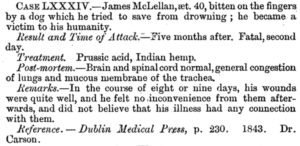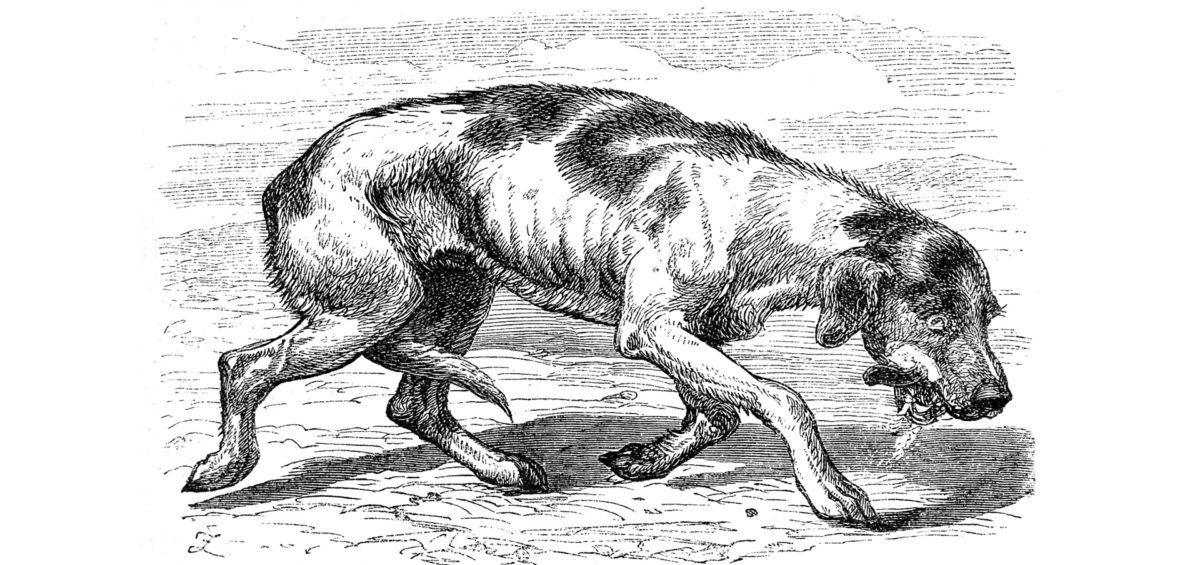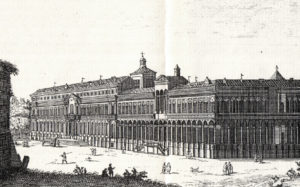In April 1860, a 38-year old Italian man was bitten by a “mad dog” carrying the rabies virus. One month later, he was admitted to the historic Grand Hospital of Milan “suffering with all the symptoms” himself. He soon found himself in the care of Professor Giovanni Polli, a noted physician and chemist, who resolved to “treat him solely by haschisch” using “the brown-black extract which I had used in the experiments on myself.”
Professor Polli administered 2.5 grams of hash orally over a 24 hour period (aided by “a litre of infusion of coffee by the rectum) and the results were dramatic. Although the man died 56 hours after admission, his final two days were filled with “amiable good-humour” accompanied with “the cessation of the delirium, the terror, and the convulsive madness.”
His report on the case was one of the first to recommend cannabis as a tool in palliative care.
The hashish, without curing the hydrophobia, removed the greatest part of its horrible symptomatology; a result accomplished neither by opium, nor by morphine, nor by dateline. Hashish, then, is the best palliative or sedative in hydrophobia. It changes a raving, unmanageable, suspicious, aggressive maniac, who bites and who curses, into a poor invalid, content and tranquil, who blesses you.
On Haschisch in Hydrophobia
Medical Press and Circular, December 15, 1869
By Professor POLLI, of Milan.

There are a number of accounts of 19th century physicians using cannabis to treat rabies, including this one of poor James McLellan, an Irishman who “became a victim to his humanity.”
Among the effects resulting from the administration of a large dose of haschisch, I have been struck by the singular impressionability to slight currents of air, and to the glittering of bright bodies; and especially have I noticed the sensation of a species of suffocation, a sensation which seemed to me to be analogous to that which would be produced by a layer of cotton-wool adhering to the pharynx. This singular alteration of sensibility inspired me with the idea of making a trial of haschisch in the treatment of hydrophobia – an attempt to treat an incurable and mysterious malady by a no less mysterious remedy.
A man, aged thirty-eight years, was admitted into the Grand Hospital of Milan on May 12, 1860, who had been bitten by a mad dog a month previously, and who was already suffering with all the symptoms of hydrophobia. I determined to treat him solely by haschisch. I employed the brown-black extract which I had used in the experiments on myself. He was made to swallow half a gramme (7.7 grains) of it every four hours for five times, so that he took altogether 2 1/2 grammes (38.5 grains) of this extract of Indian hemp. It was cut into small pieces and placed on the tongue; the swallowing of the drug was assisted sometimes by a little sugar, sometimes by a little milk, and sometimes by a little tincture of anise-seed. The action of the haschisch taken by the mouth was aided by enemata of an aqueous infusion of coffee, 80 grammes (3.8 ounces) of powdered coffee to a litre (1.76 pint) of water, which was repeated. In a period of little less than twenty-four hours this hydrophobic patient had taken 2 1/2 grammes of extract of Indian hemp, and a litre of infusion of coffee by the rectum. This treatment did not dispel the characteristic phenomenon of horror at the swallowing of water or of any fluid; neither was there freedom of alpine dejections or of emission of urine. The patient remained very constipated and the ruin had to be removed by catheter. The patient succumbed fifty-six hours after his admission into the hospital; but the evident effect of the haschisch taken was an amiable good-humour, a species of gayety, and of reliance on medical aid; and the cessation of the delirium, the terror, and the convulsive madness which seize on all hydrophobic persons to such an extent that it is necessary to use physical constraint. Bright light, also, the reflection of shining bodies, currents of air or of the breath, which are insupportable by ordinary hydrophobics, in him produced no disagreeable impression. This patient was left at liberty, that is, without any bonds, lying free on his bed; and this tranquil state lasted forty-eight hours, after the commencement of the treatment by haschisch, and was only interrupted by some convulsion or grimace, which slowly became more frequent, and by the menace of suffocation from the foam at the mouth as the mortal symptoms increased, until his death.
The haschisch, without curing the hydrophobia, removed the greatest part of its horrible symptomatology; a result accomplished neither by opium, nor by morphine, nor by daturine. Haschisch, then, is the best palliative or sedative in hydrophobia. It changes a raving, unmanageable, suspicious, aggressive maniac, who bites and who curses, into a poor invalid, content and tranquil, who blesses you.




